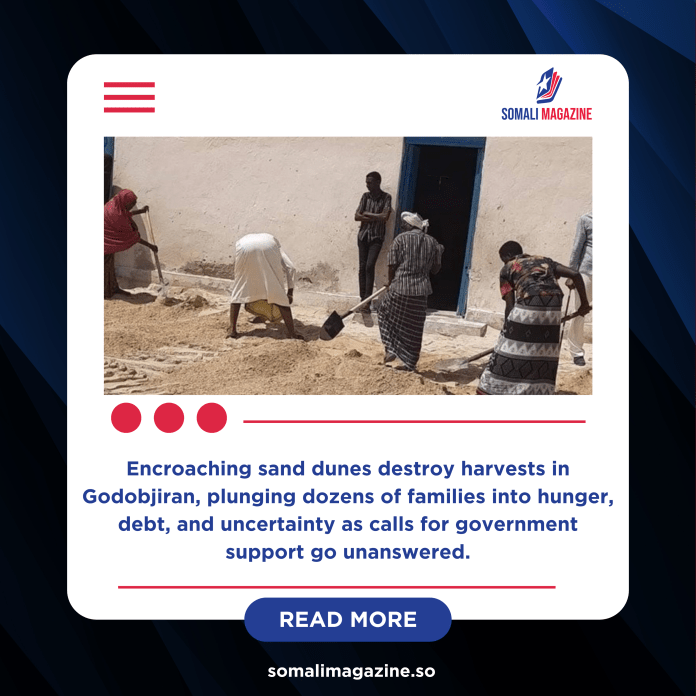Facebook Twitter (X) Instagram Somali Magazine - People's Magazine
Farmers in Godobjiran, a town in Puntland’s Nugal region, are facing a serious crisis after sand dunes buried their farmlands. Years of drought and the loss of vegetation have left the land vulnerable to winds that blow in sand from the coast. The result is an environmental disaster that has destroyed harvests and left many families in hardship.
One of the affected farmers, Mohamed Shire Adan, has been farming a three-hectare piece of land since 2017. After good seasonal rains, he planted beans and watermelons, hoping to earn at least $3,000 by selling the produce in Garowe and Galkayo. But by the time harvest season arrived in June, his entire farm was covered in sand.
“The farm my family depended on is now buried,” Mohamed said. “We used to eat three meals a day, but now we only manage one or two. My children had to stop going to school because we don’t have money.”
In February, Mohamed borrowed $1,200 from local traders to buy seeds and hire farm workers. He expected the harvest to help him repay the debt. Instead, he now faces pressure from creditors and a mountain of unpaid bills.
“I can’t pay back what I owe. It’s the biggest loss I’ve ever faced, and it’s all because of the sand,” he added.
The sand has been creeping into his land for the last three years. But things got worse in May when drought wiped out the grasses and shrubs that used to hold the soil in place. Without that natural barrier, the wind quickly covered farms with sand.
Despite efforts by the local community to plant windbreaks and install sand barriers since 2023, nothing has stopped the sand from taking over.
Another farmer, Diriye Abdirahman Ahmed, shared a similar story. He planted his two-hectare farm in March, investing $800. Like Mohamed, he hoped to make good money from selling crops. But his farm has now turned into hills of sand.
“We used to earn up to $3,000 and live comfortably,” Diriye said. “Now, we only eat once a day. My family of 10 is surviving on food donated by relatives. The sand has ruined everything.”
Diriye now owes shopkeepers $230 and can’t get any more goods on credit.
Adan Jama Qasaal, head of the local farmers’ cooperative, confirmed that all the farms in the area — about 10 square kilometers — are buried under sand. The disaster has affected 38 families, each with around 12 members.
“We need a bulldozer to remove the sand and open blocked valleys,” said Adan. “We’ve asked the regional and district authorities for help, but we’ve received no support. We are ready to work and help ourselves, but we need machinery and resources to do it.”
In June, the cooperative made an official request to Puntland’s Ministry of Agriculture for heavy equipment and support for replanting trees. So far, they have not received a response.
Environmental experts blame the problem on desertification, made worse by climate change, overgrazing, and deforestation. When plants and trees disappear, the bare soil is easily blown away by wind, allowing sand to spread and cover fields and irrigation systems.
Without urgent action, the farmers of Godobjiran face a future of hunger, poverty, and rising debt. Their story is a clear warning about the growing impact of climate change and the need for real support to protect vulnerable communities.

